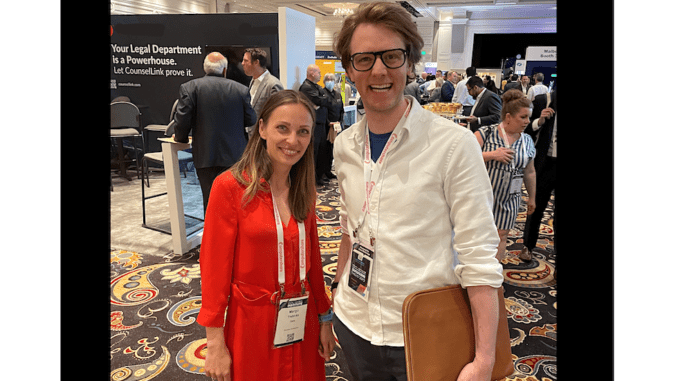
In this guest post for Artificial Lawyer, Hugo Seymour, Chief Operating Officer at Della, looks back on what happened at CLOC’s CGI event in Las Vegas last week.
Some things at CLOC jumped out at you, like Mike Haven, the organisation’s president, arriving on stage to an Eminem soundtrack, but the main difference of this year’s event compared to other conferences was its focus. The vision the speakers and the vendors presented was a shift in the centre of gravity of the legal function.
Other Artificial Lawyer articles, and the blizzard of funding announcements, made it clear that Contract Lifecycle Management (CLM) is hot and the same went for the conference floor. Many of the talks on offer focused on adoption of CLM systems and their related components. So far, so seemingly ordinary, as technology makes traditional labour-intensive processes more efficient and more scalable for enterprise size firms.
Assuming this is business as usual (BAU) is a mistake. The CLOC zeitgeist is trying to make the world a better place for businesses and we are witnessing a redrawing of the lines for what counts as ‘legal’. Troy Dunham was reporting that ServiceNow used to handle more than 4000 NDAs a year. Human review of this amount of paperwork to an acceptable standard and within budget is improbable. With the benefit of a legal operations overhaul, 97% do not touch human hands, eyes or brains with revenue facing contracts following shortly. Overall 15% of the workflow that used to flow to the legal team has been diverted into the hands and microchips of the legal operations teams.
The overall, lasting impression of this year’s CLOC conference was one of confidence and a maturing market. The increasingly sophisticated workflow management capabilities and integrations with other providers are now headlining product talking points.
Agiloft’s no-code integrations are a good example of how increasingly disparate data is being pulled into useful repositories. Sessions on the legal operations side now talk about vendor selection, with the implicit assumption that there are usually multiple tools that can actually tackle multiple elements of your problem. Something my team and I have seen on multiple occasions, as we talk to firms and companies of all shapes and sizes.
The predicted next move in the CLM space is a combination of Contract Analytics and the Lifecycle Management – to offer a single tool that combines lifecycle coverage with the ability of a data analytics platform. Julian Tsisin at Meta referred to this as a CALM, Contract Analytics and Lifecycle Management.
The analytics piece provides the option to do the deeper analytics on points that fall outside the traditional lifecycle data points of a contract, for example Della’s ability to answer bespoke questions. This is all a part of the ultimate goal of creating a predictive and, crucially, proactive system that begins to flag potential issues before they occur and can provide the necessary answers when they do.
So far, so familiar, from the ‘preventative’ model of contract management marketing. The change is that legal operations teams are expanding their perceived territory. Contracting and contract management fall fully within their fiefdom, but increasingly ‘legal’ areas are apparently migrating too. Some regulatory compliance, privacy analysis and other areas are seemingly going to be covered by this reimagined and reengineered process. This is accelerating thanks to the escalating battles between private practice firms over junior lawyers’ salaries, which makes diverting work away from them attractive and, increasingly, necessary.
This year’s CLOC talks were not simple cheerleading exercises. A session on being prepared to fail by James Donald at Accor, and several others, discussed the difficulties and challenges from the perspective of the perennial bugbears of adoption and implementation. Andrew Brereton and Troy Dunham noted that with adoption of enterprise grade systems it is simply too expensive not to use the tools you’ve purchased and remain credible. Launching a project to introduce one of the options is not a risk-free exercise.
As noted in other articles, the skills required in a legal ops and contract ops role are increasingly at a premium, and are subject to bidding wars between the major players, which now include the elite consulting and accountancy firms.
It follows that the rise of the legal operations function is changing the skill sets required in a Chief Legal Officer (CLO) and General Counsel (GC). Top class legal skills are still required, but, echoing the evolution of the Chief Marketing Officer (CMO) and Chief Revenue Officer (CRO) positions, the ability to manage and/or implement the systems necessary to run a data-driven legal function is going to move from a ‘nice to have’ to a ‘must’.
In general, the feeling is that change is coming and, increasingly, happening, thanks to CLOC’s members. The question for the legal function is whether this is an evolution or an insurgency?
—
Hugo Seymour is Della’s Chief Operating Officer. Della provides law firms and in-house legal teams with artificial intelligence to accelerate review and audit of legal documents.
[Main Pic: Hugo Seymour and Margo Trebicka, Sales Director.]